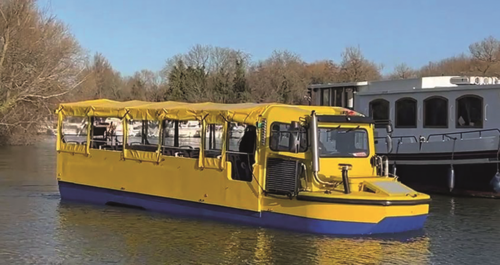
The future of green transport technology has been on show at Coventry University’s Institute for Advanced Manufacturing and Engineering (AME). Thirteen businesses with a focus on efforts to reduce the transport sector’s reliance on fossil fuels were chosen to be part of the Clean Futures accelerator programme, which saw them receive up to £50,000 to trial their solutions and address challenging areas associated with the rail and automotive manufacturing sectors.
Clean Futures is led by Connected Places Catapult alongside Coventry University and the Black Country Innovative Manufacturing Organisation. The firms chosen are being supported by Coventry University’s Research Centre for Manufacturing and Materials.
Ideas and prototypes that were on show at AME included a new way of charging electric motorbikes used by food service outlets and an amphibious tour bus that can be driven on the road and on water. Its developer, Seahorse Amphibious Vehicles, currently has one bus in Cape Town, South Africa, and another in Liverpool, with plans to deliver further vehicles to Helsinki, Singapore and Glasgow.
Co-founder Ed Lumley said: “We started off using diesel but as times have moved on we’ve seen a real gap in the market and a need to become clean and use clean energy. We’re now developing an electric vehicle and we’ve been using second-life components, so from things like crashed electric vehicles we’ve been taking the batteries and we’ve been trying to get them to communicate with our own systems as well.
“We heard about Clean Futures about eight months ago and this being the first time this grant was launching. We were awarded the grant and it’s been fantastic. It’s given us credibility in the market which has allowed us to sell these electric amphibious vehicles – at the start of the project we had no sales but by the end of the project we had sales for five electric vehicles.”
Professor Marcos Kauffman, Director of the Research Centre for Manufacturing and Materials and Institute for Advanced Manufacturing and Engineering, said: “The Clean Futures project is aimed at helping the West Midlands Combined Authority in achieving its 2041 net zero strategy. The combined authority created a road map to 2041 and identified certain areas of critical technologies that will be necessary for us to achieve net zero in our region; industrial emissions, transport emissions and housing emissions.
“In this programme we are particularly tackling transport emissions and these 13 SMEs are working in a range of technologies, mostly related to internal combustion transition to electric vehicle. We have battery cell chemistry, battery cell componentry, companies working on clean sustainable fuels, clean sustainable materials and material recovery from recycling of old vehicles.
“It’s very exciting to have everything come together and the SMEs having their technologies here so we can see the result of the work that we’ve done in the first six months of this project with the first cohort. It is also exciting to see the cross-pollination of the local companies that are all working on complementary technologies that could come together to really make a difference in our region.”

